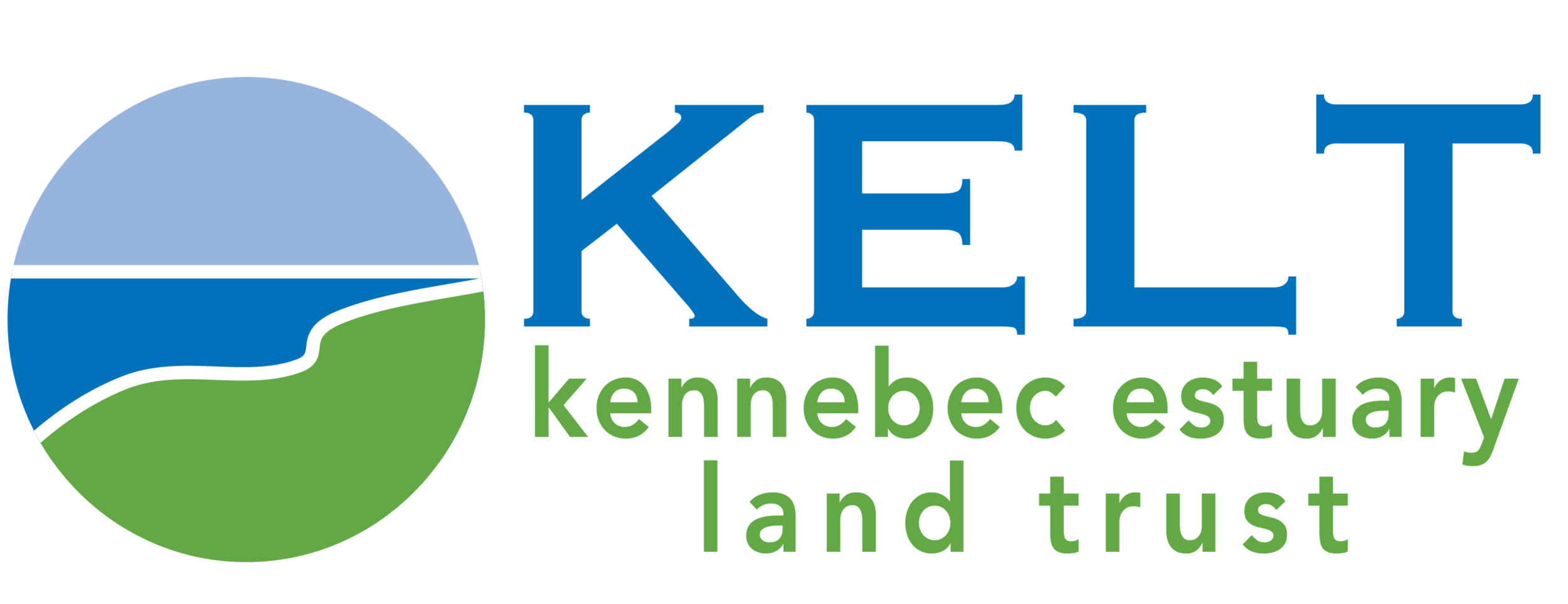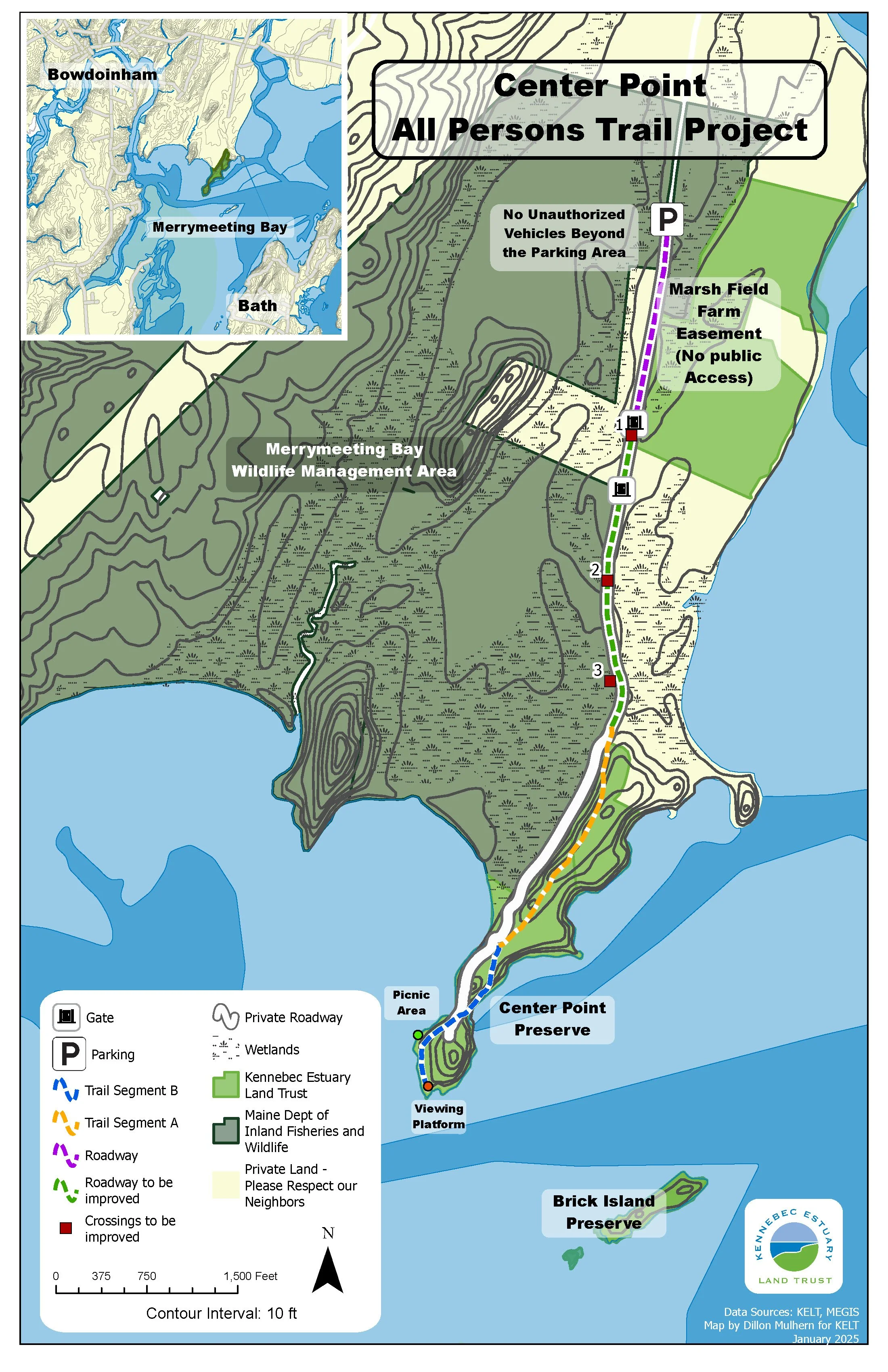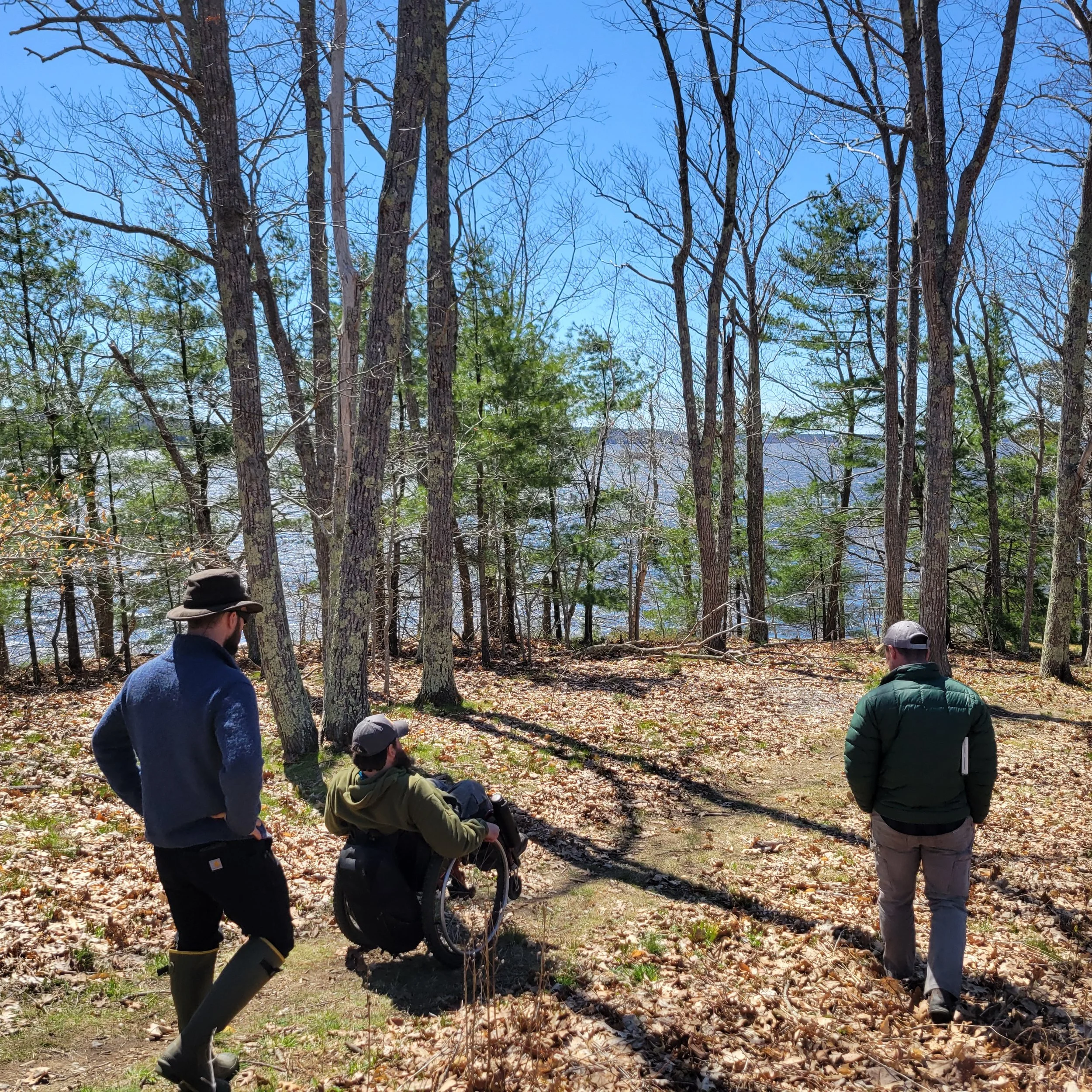Center Point
All Persons Trail Project
Project Vision
Thanks to a multi-year collaboration of many partners, KELT acquired the 22-acre Center Point Preserve property in February 2023, later adding an additional 11 acres to the Preserve in December of that year. We have received over $600,000 of grant awarded funding to improve wetland habitats and build a trail system that can meet the US Forest Service accessibility standards, thus improving access for people with a wider range of mobility capacities.
Your support of the project will…
→ Increase resiliency and restore 33 acres of forest and wetlands, protecting vital natural gifts.
→ Improve and increase public access to Merrymeeting Bay, allowing for a broader range of users to get outside including our community’s elders and families.
→ Increase shared information about the trail system, such as improved signage, so that users can make safe and informed decisions while visiting the preserve.
→ Improves road sustainability as storm and flooding events increase in frequency and impact.
“At its core this project is about habitat restoration - from enhancing wetlands with increased tidal flow to concentrating visitors onto a single durable trail surface that will enable us to reforest the areas cleared from prior land uses.”
Project Funding & Phases
KELT was recently awarded three grants that will enable a more resilient trail system on the point and improve habitat conditions. This improvement work will be conducted in three phases, across several years. Construction will likely begin in 2026.
We are seeking funds for all phases of the project!
Phase I: Wetland Habitat Restoration
We have received a $468,000 grant from the Maine Natural Resource Conservation Program to replace three culverts that restrict tidal flow. These improved structures will allow full tidal movement, and drain flood waters faster than the currently sized infrastructure. The aim is to enhance the surrounding wetland habitats especially as rare freshwater tidal marshes migrate inland due to sea level rise, make the road itself more resilient, and reduce the flooding impacts. Structures will be designed and built to met the standards set by the Department of Marine Resources in the CoastWise Approach for Tidal Crossing Design (CoastWise: Rethinking Tidal Road Crossings | Department of Marine Resources).
“This MNRCP funding will enable Kennebec Estuary Land Trust to upgrade three restricted tidal crossings. These new structures will enhance 22 acres of freshwater tidal wetlands, thereby improving high value wading bird and waterfowl habitat, enhancing fish habitat connectivity and nutrient exchange, increasing flood water drainage capacity, and facilitating freshwater marsh migration. This is particularly important in Merrymeeting Bay - one of the most diverse ecosystems in the state.”
Phase II: All Persons Trail Project
We have received $170,000 in total, from the Recreational Trails Program and the Maine Outdoor Heritage Fund to improve the trail on KELT’s Preserve to meet USDA Forest Service accessibility standards. This will formalize the trail system, transition visitors off of walking on the road and onto the trail, and allow people with a wider range of mobility capacities to experience the amazing bay.
“By building an All Persons Trail we provide a clear space for recreation, so that we can rehabilitate disturbed and damaged landscapes. Having a well defined trail allows us to rewild other parts of the property that have been impacted by historical use. We have already begun this process, most notably in removing a building on the property and rehabilitating the habitat that was impacted by this structure. Work continues with removing invasive plant species, allowing natural forest succession to occur in the field where the house once stood, and regenerating the forest understory.”
Example of an accessible trail: Round the Mountain Trail, Coastal Mountains Land Trust.
Phase III: Improving Roadway
The final phase will be improving the roadway surface. The 10-foot-wide private roadway will be regraded according to the current best practices for gravel roads as set forth by Maine Department of Environmental Protection Bureaus of Land Resources and Water Quality in their “Gravel Road Maintenance Manual A Guide for Landowners on Camp and Other Gravel Roads.”
“Overall, making the road trail on Center Point Preserve more accessible to more people is relatively straightforward... After the improvements you will have an amazing property to enjoy views of Merrymeeting Bay. [My] suggestions for removing and minimizing physical and communications barriers represent opportunities for making this property more accessible to a wider group of users.”
What is an All Persons Trail?
The Center Point All Persons Trail will be compliant with the USDA Forest Service Trail Accessibility Guidelines.
Andrew Morgan, Enock Glidden, and Matt Coughlan conduct a trail assessment at Center Point Preserve.
Improving accessibility includes minimizing physical barriers like steep trail grades and uneven surface materials, as well as communications barriers. KELT worked with Enock Glidden (Outdoor Access Solutions) to assess the current Center Point trail system. Enock’s recommendations included mitigating water damage, and building a tread way that is wide, cleared, firm, and stable with minimal cross slope. He also suggested many other infrastructure enhancements and recommendations for improved signage, which would allow trail users to make informed decisions about the the level of challenge they wish to experience.
Matt Coughlan from Recon Trail Design, LLC. is an experienced non-motorized trail designer with a specialty in accessible trails. His conservation-focused approach incorporated Enock's recommendations and developed a trail design that both meets the desired accessibility standards and is thoughtfully placed to protect the amazing resources on the point.
Accessibility also goes beyond physical and informational barriers. There are very few publicly accessible spaces along Merrymeeting Bay, and we believe that everyone deserves to cultivate a relationship to the land. At Center Point Preserve, anyone can experience the magnitude of this incredibly special place - where rivers and communities converge. Community-centered conservation focuses on providing equitable access to public land. Building a relationship to the bay and appreciating the estuary’s gifts is both a necessary step in conservation and a necessary piece of KELT’s mission.








